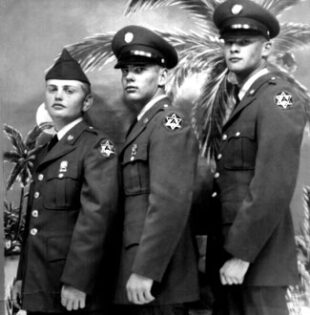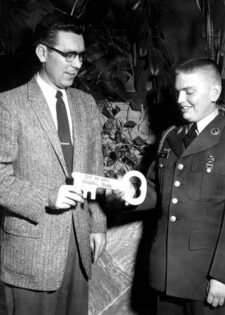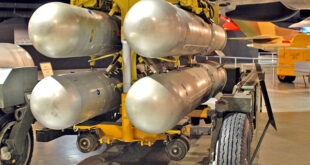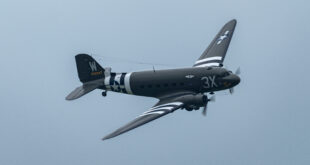by Marvin J. Wolf, The War Horse
On the third day of a weeklong field exercise at Fort Lewis, our company XO drove me back to the garrison for an appointment to fit me for a temporary dental prosthesis. Afterward, he picked me up and we headed back out to where we were supposed to catch up with Delta Company. He drove muddy roads through thick forest for nearly an hour until I was sure that he had no idea where we were, much less where our company was.
Finally, he stopped at the junction of two dirt roads, neither much more than a track. “I think they’re just a little farther down this road,” he said. “Stay right here. Don’t wander off. If the company comes by on the other road, find an officer and tell him that I’ll be back shortly.”
I hopped out, grabbed my rifle and field gear, and watched him drive off. As the sound of the jeep engine faded, I looked northward. The sky was dark and menacing, and the wind was very cold.
Rain, I thought.
My father had been both a Boy Scout and, as an adult, a troop leader. He had told me more than once that I was always to carry a knife in the woods. On the first day of basic training, I was forced to surrender my pocket knife. In its place, I carried my sharpened Army-issue bayonet.
Now I used that sharpened eight-inch blade to cut thick boughs from the nearest trees. I put a layer to sit on next to the south side of the trunk of a giant Sitka spruce. Then I cut more boughs and laid them across the lower branches. With darkness falling, I cut a third armload and laid it against a gap in the spruce’s lower branches.
Then the storm hit. Snow, not rain.
READ MORE: In this overnight survival mission, a Coast Guard Crew Rescued People From Floodwaters On Christmas Eve, 1955
I took cover in my makeshift shelter as the first snowflakes fell. The wind picked up. In five minutes, everything was blanketed in white and I couldn’t see more than a few feet down either track.
I donned my rain poncho, sat down on the branches, stood my rifle on end between my thighs as a sort of tent pole, and tucked the poncho tails under me. The tree blocked most of the wind and, together with my poncho, shielded me from snow. I had no timepiece, but I believed it was about 5 p.m.
As night fell, I realized that the XO wouldn’t return. And as the temperature plummeted and the storm grew more intense, I realized that even if Delta Company was half a mile down the road, I’d never find them. Moreover, I had no idea where the XO had gone. I had a little shelter. I was at a road junction, and I believed that no officer in his right mind would abandon one of his men.
That made me wonder if something had happened to the XO—did his jeep slide off the road into a ditch? Hit a tree? Break down? Had something distracted him until he forgot about me? Sooner or later, I told myself, Sgt. 1st Class Tabor or 1st Lt. Townley would ask the XO about my whereabouts.

Marvin Wolf, left, during basic training in 1959. Photo courtesy of the author.
I hadn’t eaten since breakfast 12 hours earlier; in a pocket, I had a thick, circular disc of C ration chocolate, sealed (since 1943!) in protective aluminum foil. I had water in my canteen and in my pack was a can of Sterno. I decided not to eat the chocolate yet; I might grow much hungrier before help came. I laid my metal canteen across my knee, put the Sterno atop it, and lit it with a match. It got warm under the poncho but the fumes could not escape, so when I grew lightheaded, I snuffed out the flame. I dared not sleep; I didn’t want to lose a limb to frostbite.
The storm intensified. I wondered if the exercise had been called off and my unit returned to the garrison, perhaps by another route. It had happened before. I reconciled myself to staying put until daylight. I’d fasted every Yom Kippur since my bar mitzvah at age 13, going without food or water for more than 24 hours—so I knew that I wouldn’t starve from a day and a night without eating.
* * *
There came a day when I was 10 years old and everyone in my immediate family had the flu. Unwilling to miss a day’s pay, my father went to work anyway.
My mother pinned an envelope stuffed with cash inside my overcoat, handed me a piece of paper with instructions to take the Kedzie Avenue trolley south to Madison Street, then transfer to the east-bound Madison bus to the Loop, then walk three blocks to a particular building, where I was to take an elevator to the eighth floor and there find the finance company I was to give the money to. She gave me two nickels, one for each way.
“Could I have another nickel, please?” I asked.
“Why?”
“In case I get lost, I could call home.”
“Don’t get lost,” she said and shooed me out the door.
Half an hour after leaving home while traveling south on Kedzie, an unseasonable snowstorm swept in off Lake Michigan, and every bus and trolley car in Chicago came to a halt. Anxious to complete the errand, I went the rest of the way on foot, fighting my way more than five miles through a blizzard to make a payment to a loan company. The office manager saw that I was exhausted and that it was still snowing. He drove me home. My feet were swollen and blistered, but after that, I was allowed to ride the bus alone anywhere.
* * *
I awoke with a start, half expecting my mother to be standing at my bedside with a bowl of chicken soup. Instead, I found only the wind, snow, and darkness. I decided that at daylight I must leave; I couldn’t survive another night under the tree. I’d walk back the way we came in the XO’s jeep until I reached the state highway that led to the garrison area. It was only a few miles. I was carrying a rifle. I knew that I could get a passing motorist to stop.
And so passed the night. When I got too cold, I stood up, stretched, stamped my feet for a few minutes, sipped a little water, and sat back down. I collected snow in my steel canteen cup. I knew eating it would lower my body temperature, so I brought the cup under the poncho and lit the Sterno for a few minutes. It took a lot of snow to make a little metallic-tasting water.
By daybreak, the storm had moved on, though it remained windy. I stepped into the road—and sunk into wet snow up to my knees. My combat boots were far from waterproof, and as I took a step toward the paved road, I realized that I’d be marching on wet feet; it would be a tough hike. I took another step—and just then the wind shifted and I heard the faint roar of diesels and above them the distinctive, creaky, rattling whine of bogie wheels.
Tanks!
I stopped, waiting.
Half an hour crept by. Then slowly the distinctive sound intensified. Suddenly a huge M48 Patton tank blanketed in white appeared in the same spot on the same road where I’d last seen the XO, its 52-ton bulk flattening the snow for the column of personnel carriers in its wake. My company commander’s jeep appeared. He stood up from his seat, raised an arm in the “halt” signal. As the column rocked to a stop, he jumped out.
“What the hell are you doing here?” he demanded.
I replied that the XO had left me here and ordered me to stay until he returned.
“When was that?”
“About 1600 yesterday, sir.”
“You were here all night?”
“Yes, sir.”
“We were half a mile down the road,” he said. “You okay? No frostbite?”
“I’m fine, sir. I cut boughs and made a little shelter for myself. But I could handle something to eat.”
“Do you know why the XO dropped you here?”
“Not for sure, sir. But I could guess.”
“Let’s hear it,” said the captain.
“I’m pretty sure that either he lost the grid coordinates for the company’s location, or else he has trouble reading a map.”
“But you don’t have trouble reading a map?”
“I’m certain that if you asked Lt. Townley or Sgt. Tabor, they would confirm that I can read a map.”
“Did you offer to help the XO?”
“I asked to see the map, sir, and said that maybe I could help him. He kind of ignored me. And it wasn’t my place to tell an officer that he was lost, sir. But in fairness to the XO, this part of the maneuver area pretty much lacks distinctive landmarks. It’s all relatively flat and wooded until you go south to the Little Remagen Bridge.”
“As long as you’re in good shape,” said the captain. “Third Platoon is right behind me,” he added.
I was loaded into a personnel carrier, where somebody gave me a box of C rations.
Apparently, the XO had simply forgotten me. Or perhaps, by the time he remembered, he assumed that I had followed him back to the company area. The blizzard struck right after his arrival and just before the evening meal. My absence, though noted by my squad and platoon leaders, was not reported; they assumed that I was either goldbricking back at garrison or still with the XO, whose return they were not aware of.
Soon after the storm hit, Delta Company had received a radio message to stand down from the exercise and its troops had taken refuge in their personnel carriers. For reasons that I still don’t quite grasp, the fact that I had survived a night in a howling blizzard—kept my head, improvised a shelter, and obeyed orders to stay put—somehow redeemed me with my peers. Men seemed to know who I was. Guys I’d never spoken with nodded hello in the mess hall or kidded me about something.
Back in garrison, Sgts. Tabor and Cruz sat me down in the arms room that doubled as the platoon office and had me tell them, in detail, how I survived the night. I wondered for years why such a fuss was made; at no time had I believed my life in danger. Tabor asked how I’d known what to do.
“When I was left by the road and the sky looked like a storm, I just thought it through,” I said. “There was no reason to panic. What was my situation, what were my problems, what did I have to work with? Any soldier would have done the same.”
Tabor shook his head as if to say I was wrong; his opinion of the common soldier, it seemed, was far below my own.

After being left overnight in a snowstorm during a field exercise at Fort Lewis, Marvin Wolf was nominated for Soldier of the Month—and won. He earned a trip to the Washington state capital, where he was named honorary governor for the day and presented with a key to the city. Photo courtesy of the author.
I never saw the XO again. A sergeant from another platoon told me that he had resigned his commission and left the Army.
A few weeks after the blizzard, 1st Sgt. Wedl sent for me again. He said that I had volunteered to compete for the title of Ft. Lewis Soldier of the Month. I would first represent Delta at a battlegroup competition. If I won, I’d get a three-day pass and compete in the next round. Competition progressed upward from each battlegroup through the command levels of the Fourth Infantry Division and then postwide. Wedl didn’t ask if I wanted to compete.
The exam turned out to be much like the Junior R.O.T.C. City Colonel competition I’d won less than a year earlier: A panel of senior officers questioned me about the chain of command (“Who is secretary of the Army?”), various military subjects (“What color are map contour lines? What is the first action required to disassemble an M1 rifle?”), then inspected my uniform and asked more questions.
I won and went on to the next level. And won again. And won twice more. And was selected Fort Lewis Soldier of the Month.
Years later, when I became a company commander, I learned that these competitions were a source of much entertainment to first sergeants, sergeants major, and even senior commanders. Odds were given on various candidates; money, drinks, and other valuables were wagered; and head games and speculation were common. I suspect Wedl pocketed a healthy sum after my victory.
Ordinarily, the Soldier of the Month was immediately promoted one grade. But I had been a specialist four less than a month and worn the uniform less than a year. Even with all the waivers, I did not qualify for another promotion. A good thing. Surely some Delta Company specialist four would have shot me if I had returned wearing sergeant’s stripes.
Instead, I got a three-day pass and a trip to the state capitol in Olympia where I was declared honorary governor for a day and allowed to sign some meaningless proclamation. I was presented with the key to the city of Olympia and toured a brewery, where on account of my tender age I was denied even a sip.
I was glad to get back to Delta Company, where for the next few months, in the field as in garrison, I found my squad leader, Staff Sgt. Cruz, competent and fair. He never became my friend, but I earned his respect. In February 1960, after a year in uniform, I received orders for Korea, and that was the last I saw of Cruz.
This article first appeared on The War Horse, an award-winning nonprofit news organization educating the public on military service.
 Soldier of Fortune Magazine The Journal of Professional Adventurers
Soldier of Fortune Magazine The Journal of Professional Adventurers






